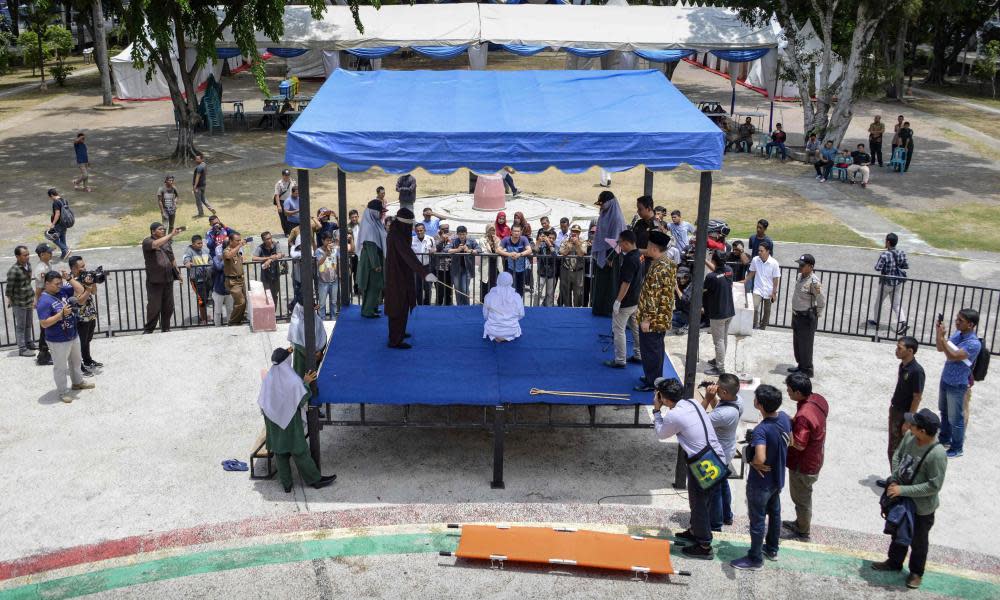Indonesian president postpones plans to outlaw extramarital sex

Indonesia’s president, Joko Widodo, has ordered his government to postpone the ratification of a deeply controversial criminal code that would outlaw living together outside marriage, extramarital sex and insulting the president.
The apparent climbdown came in a surprise address at the state palace on Friday afternoon, and follows an outpouring of anger and criticism about the draconian draft laws.
“I have ordered the law and human rights minister to convey this decision to parliament, to delay the confirmation of the criminal code bill,” the president, better known as Jokowi, told a televised news conference. He said he had decided the bill needed further review after taking into account input from various groups who objected to parts of it.
The Indonesian parliament has spent decades revising its colonial-era criminal code, creating a 628-article draft bill that it was due to be put to a vote on Tuesday.
More than 300,000 people had signed a petition calling for Jokowi to step in and stop the bill from being passed.
The draft penal code applied to everyone in Indonesia, including foreigners, although it was not clear how it would be enforced in holiday hotspots such as Bali. Australia updated its travel advice to warn its citizens of the possible changes.
Activists said it would usher in sweeping changes to Indonesian law that would be disastrous for women, religious and sexual minorities in particular, as well as for press freedom.
Related: Outcry at Indonesia draft criminal code that could see unmarried couples jailed
“This is a moment he will be remembered for,” the petition’s author and women’s rights activist Tunggal Pawestri said before Jokowi’s statement on Friday.
“What legacy does Jokowi want to have? As a president who is remembered for including a dictatorial and anti-human rights agenda in the penal code? If he really cares about his image as a president of the people then he needs to follow the voice of the people.”
Among the provisions in the draft code are articles that would outlaw de-facto relationships and extramarital sex, which activists fear would in effect criminalise same-sex relations. Insulting the president would become a criminal offence punishable by three and a half years in prison.
Using the hashtag #semuabisakena, meaning “this effects everyone”, the petition highlights problematic articles, including those that would also criminalise buskers, beggars and sex workers.
The petition also notes an article in the proposed code that refers to “living law”, which Human Rights Watch says could be interpreted to legitimise hundreds of discriminatory sharia bylaws already in place at the local level.
“This petition has attracted the attention of a lot of people who have realised, this is the situation that we will have if this bill is passed,” said Pawestri.
Pawestri first started the petition in January 2018 to focus on how the draft penal code – which has been decades in the making – would negatively affect women and LGBT people, but in recent months it has morphed into a more broad critique, garnering more than 440,000 signatures.
The bill exposed the fault line between liberals and an increasingly socially conservative society in the world’s largest Muslim-majority nation.
Rights groups said the proposals underscored a growing shift towards fundamentalism in a country long hailed for its religious tolerance.
Indonesia’s Aceh province already imposes Islamic law, and whipping is a common punishment for a range of offences including gambling, drinking alcohol, and having gay or pre-marital sex.
The proposals call for a wider interpretation of Indonesia’s blasphemy law, under which members of religious minority groups, including Christians and Buddhists, have been prosecuted in the past.
Civil society groups said they submitted comprehensive recommendations and revisions to the draft code that were largely ignored.
On Thursday, hundreds protested outside the parliament, rejecting not only the draft penal code, but also a controversial law passed this week on an anti-corruption commission, which is widely expected to weaken the body’s investigative powers.
The parliament – the source of more than 20 corruption suspects in recent years – has been derided for passing that law in secrecy and in record time.
Critics also pointed out that the draft penal code halves the sentence of those convicted of corruption or those “unlawfully enriching themselves” from four to two years.

 Yahoo News
Yahoo News 
